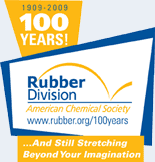![[ Visit ACS Rubber Website ]](images/logo.jpg) |
|
P3 Design and Study of Ricinoleates As Processing Aids and Activators In RubbersWednesday, October 12, 2011
Show Floor (The I-X Center)
ABSTRACT The potential of naturally available oil such as castor oil as processing aids and activators in rubbers was investigated in this study. Physical properties and cure characteristics of the vulcanizates containing the castor oil were compared with those of the standard vulcanizate which was prepared using zinc oxide and stearic acid. The castor mixed with the mixture of metal oxides was used at a fixed dose of 5 phr in the compounding process. The results indicate that castor oil is better alternative processing aid than petroleum based aromatic oils which have been reported to be carcinogenic. In addition, Zinc oxide + Stearic acid is tried and tested activators for a past few decades in rubber industries. Further, stearic acid is a saturated fatty acid obtained from animal fat, which is being replaced by naturally occurring castor oil. In this project, we have also tried to reduce Zinc oxide content in rubber formulations due to its toxicity, not by completely eradicating it, but by using a combination of metal oxides such as Magnesium oxide and Calcium hydroxide along with Zinc oxide. The cure characteristics and mechanical properties of the vulcanizate based on castor oil suggest that it could be used as a co-activator for rubber compounding. So we have tried to break the myth by using some new activator system for this Greener World. |
